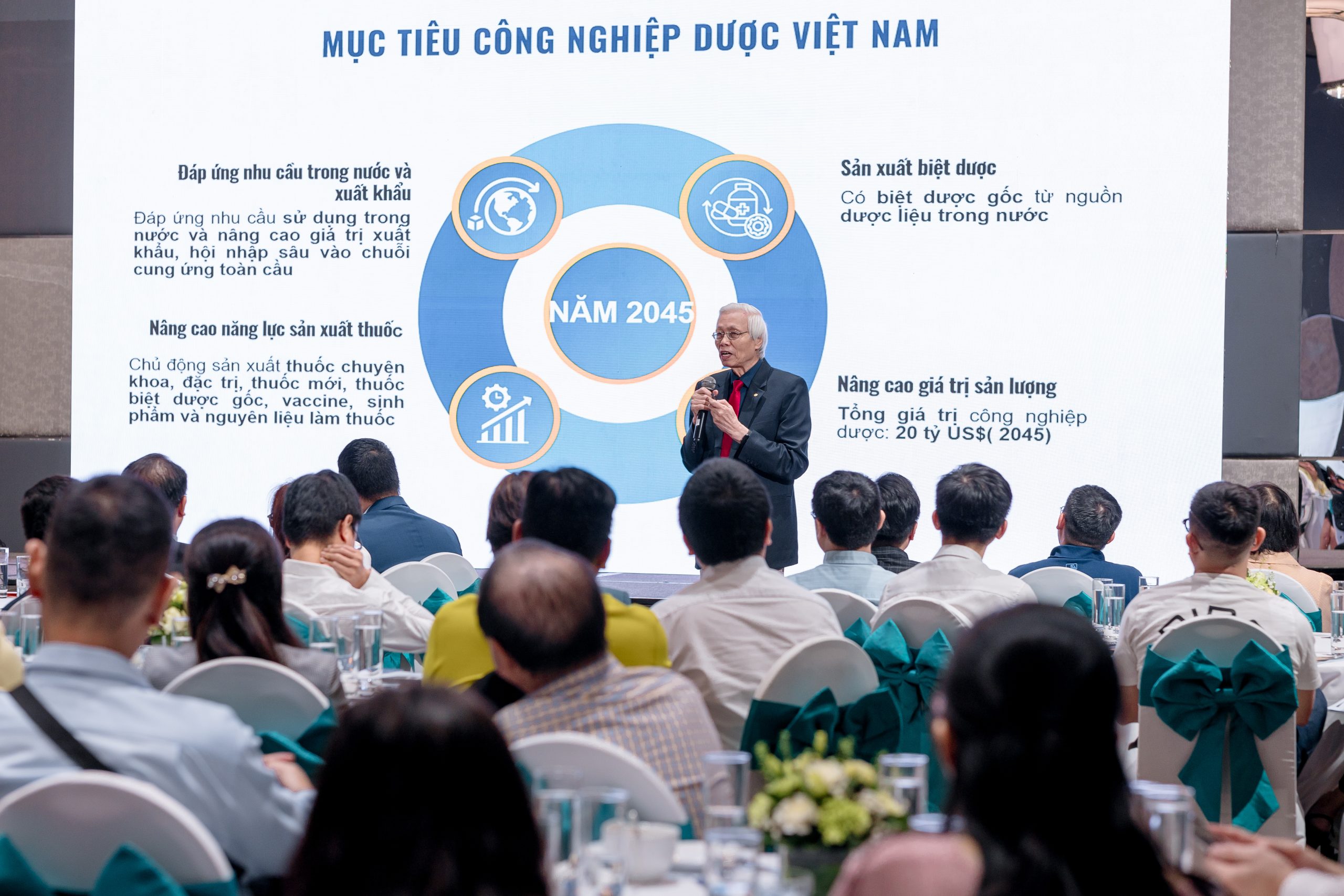Applying AI in operations and manufacturing to accelerate competition in the pharmaceutical sector
Over the past ten years, the Vietnamese pharmaceutical sector has experienced rapid expansion. However, at the same time, it has had to contend with a series of challenges related to production technology, standard compliance, and a management system that has lagged behind the latest trends, particularly in AI and Cloud. Leaders and technologists from the Vietnam Pharmaceutical Companies Association, SAP and FPT IS discussed how to digitally transform, where to start, and how to prove effectiveness before making investments.
Nearly 100 leaders from the top pharmaceutical companies in Vietnam attended the “Optimizing operations in pharmaceutical manufacturing and trading” workshop, which was organized by the Vietnam Pharmaceutical Companies Association in collaboration with SAP Vietnam and FPT IS. Participants shared their insights on the sector’s overview, development opportunities, and strategies for using technology as a competitive advantage.
“Optimizing operations in pharmaceutical manufacturing and trading” workshop organized by the Vietnam Pharmaceutical Companies Association in collaboration with SAP Vietnam and FPT IS
Wide open space for Vietnamese pharmaceutical enterprises and challenges
Speaking at the opening ceremony, Ms. Nguyen Dieu Ha, General Secretary cum Chief of Head Office of the Vietnam Pharmaceutical Companies Association, stated that the global and Vietnam’s pharmaceutical markets are facing several significant challenges amidst fierce competition and rapid technological advancements. Businesses face both internal and external challenges to optimize production processes and improve product quality in which the pharmaceutical sector’s stringent compliance standards present the largest roadblock.
Ms. Ha also shared the fact many pharmaceutical manufacturers in Vietnam today are still unable to fully integrate digital transformation into their production process. The most common situation is that most businesses invest in separate pieces of equipment and assemble each component of the manufacturing line. This hinders the computerization and digitization process. Fixing incidents after they occur is expensive and time-consuming. Many factories have begun to apply advanced equipment systems, although this is merely the outcome of individual efforts. The pharmaceutical sector has a long way to go to develop into a smart factory and a smart healthcare system.
Ms. Nguyen Dieu Ha, General Secretary cum Chief of Head Office of the Vietnam Pharmaceutical Companies Association delivered the opening speech at the workshop
“Digital transformation is the key solution to help pharmaceutical businesses operate more effectively to achieve corporate goals and compete globally. The application of cloud computing platform management solutions, artificial intelligence, big data analytics, and other digital technologies has revolutionized the way pharmaceutical companies research, develop, and distribute drugs, allowing factories to have a comprehensive view of the production process, save human and financial resources, and improve customer satisfaction,” said Ms. Nguyen Dieu Ha.
Regarding the development opportunities of the sector, Associate Professor, Dr. Le Van Truyen, Former Deputy Minister of Health and Former Chairman of the Drug Registration and Materials Council of the Ministry of Health shared that in the national strategy for developing the pharmaceutical sector, the government aims to modernize and reduce dependence on imports, putting Vietnam’s pharmaceutical sector on par with developed countries in the world. Over the past ten years, Vietnam’s pharmaceutical sector has grown at a rapid rate, with a compound annual growth rate of 7.3% and per capita pharmaceutical spending of USD 7.5 per year, surpassing that in 1990 by a factor of 150. In 2023, the Vietnamese pharmaceutical market reached approximately USD seven billion.
However, according to Associate Professor Dr. Truyen, “Vietnam’s population is facing the reality of “growing old before becoming rich”, with an average of at least 3.5 diseases per person, which creates a great demand for biologics and medications for chronic diseases.” By 2050, the biologics business is predicted to account for 55% of the market. As a result, Vietnamese companies would need to make significant investments in research and development and boost their competitiveness to keep up with major countries like China in the race to develop new drugs and meet future demand.
There are currently 3,500 different drug types available in Vietnam, but not a single original brand-name medication while newly licensed active ingredients are becoming increasingly rare and costly. The COVID-19 pandemic makes it clearly evident that the pharmaceutical sector plays a major role in addressing health security concerns; thus, we must constantly improve production capacity to meet the needs of the nation and its citizens. Regarding globalization potential, Vietnam’s export market was valued at USD 500 million; however, 23% of that amount came from Japanese companies investing in the country for low-cost production.
With great growth potential, the Vietnamese pharmaceutical sector has a plenty of opportunities to develop strongly. Associate Professor, Dr. Le Van Truyen stressed that: “Associate Professor Dr. Le Van Truyen emphasized: We must dominate the domestic market. Enterprises need to focus on developing brand-name drugs, specialized drugs, and vaccines while leveraging 4.0 technologies like cloud computing and AI to optimize production processes, boost competitiveness, and enhance international integration. Businesses must be determined to transform digitally, and all changes must originate at the top of the leadership.
Associate Professor, Dr. Le Van Truyen, Former Deputy Minister of Health and Former Chairman of the Council for Registration of Drugs and Drug Materials of the Ministry of Health shared the overview of the pharmaceutical sector in Vietnam
Reality shows that most Vietnamese businesses are not yet prepared to take advantage of them. Based on McKinsey research, pharmaceutical companies can increase revenue by up to 20% and reduce costs by up to 30% by adopting digital technologies. In particular, the application of automation and data analytics contributes to lower production costs and more process efficiency.
However, a small number of businesses have led the way in investing and implementing digital transformation, while the rest are still confused and lack the necessary strategies and resources. Topics including where to start, how to successfully implement digital transformation, how to balance costs, and how to persuade businesses that this is an investment worth making were also covered throughout the workshop.
Determination to transform digitally, making technology a core competitive advantage
Pharmaceutical sector leaders who were at the forefront of digital transformation shared their real-world insights from their experience with investments and implementations, how they overcame obstacles in the market, and how using the appropriate digital transformation strategies could lead to success.
Having operated for over 46 years, Imexpharm is regarded as one of the top players in the Vietnamese pharmaceutical market. The company presently operates four manufacturing clusters, three of which meet EU GMP standards and one of which meets WHO standards. Mr. Nguyen An Duy, Deputy General Director of Imexpharm, shared about the company’s digital transformation journey. Consistent with the quality-first strategy, Imexpharm has invested and attained GMP-ASEAN standards since 1997. With that foundation, the company must be transparent, comply with procedures, and apply cutting-edge software. In 2012, Imexpharm’s board of directors regarded this as a good opportunity to restructure the business, prepare for a new wave of growth, and invest in implementing the SAP S/4HANA system.
“When the project was first announced, there were many concerns and objections from leaders and employees at all levels due to the disruption in work. However, the leadership’s determination is what matters most. We committed, created motivation and consensus throughout the company, and reality has proven that it was the right decision. We then continued to upgrade to the cloud-based RISE with SAP system to further enhance transparency, comply with the stringent European market regulations, be prepared to manage with real-time data, and make timely decisions. This aids in the company’s rapid growth, achievement of ESG goals, and cost savings by standardizing processes,” Mr. Duy shared.
Mr. Nguyen An Duy, Deputy General Director of Imexpharm, shared about the implementation of SAP S/4HANA
Imexpharm’s business results from the last few years and the first half of 2024 have proved this with impressive numbers: net revenue reached VND 1,008 billion, up 10% year-over-year, sales revenue through the retail chains increased by 141% over the first half of last year, and sales revenue via the ETC channel increased by 33% over the same period.
GONSA – an emerging pharmaceutical company that is making impressive strides in business as well as vision for innovation, with its focus on “specializing in pharmaceutical services,” GONSA is always seeking ways to enhance its management and manufacturing capabilities. In 2023, GONSA concurrently converted up to five operating software systems: WMS, ERP, OCS, TMS, Data Warehouse & Middleware. Given that most companies only opt to execute digital transformation from one to two software programs at the same time, the company’s board of directors has taken a bold step with this decision. With 250 employees working on digital transformation projects, close to 2,000 hours of work, and more than 176 system API integration flows, GONSA completed the implementation in just 6.5 months.
The company encountered internal challenges and concerns during the early stages of its decision to undertake a digital transformation, as disclosed by Mr. Le Vi Hien, the Chairman and General Director of GONSA. “Persuade rather than dissuade– debate rather than argue. The leadership’s persistent determination and intense focus on every task inspire the team. We offer extra bonus schemes for every project to recognize and reward employees. Every problem needs at least two related answers, which is one of our principles. Mr. Hien listed a few principles the company follows while making decisions.
Mr. Le Vi Hien, Chairman and General Director of GONSA, mentioned some principles that the company follows when making decisions on digital transformation
According to Mr. Hien, as GONSA sets the direction of performing logistics and distribution activities in the pharmaceutical sector, ensuring compliance and transparency is crucial, necessitating the gradual development of infrastructure and technology systems. He also stressed that digital transformation is a challenging process that involves multiple stakeholders, and that the most crucial factors in selecting a partner include the best solution and the capability to execute it successfully.
According to Mr. Hien, to successfully lead the digital transformation process, the company’s board of directors must create unity and solidarity throughout the organization with regard to strategy and resources to guarantee a consistent implementation. The board must then select a qualified and experienced technology unit to assist it, set project goals and milestones, place the right employees in the right roles, promptly develop incentive and reward schemes, standardize data, and, lastly, guarantee internal communication.
As a partner of hundreds of businesses across various fields including the pharmaceutical sector, Mr. Dang Truong Thach – Executive Vice President of FPT IS Company stated that: “The digital transformation projects that FPT IS has supported for pharmaceutical companies are all focused on helping these companies leverage technology to solve specific problems, advance the “Co-creating” mission, collaborate with them, pool their resources, and grow continuously. Specifically, we believe that leading the way in applying technologies such as cloud computing and AI is an inevitable trend that will affect all businesses in general and pharmaceutical companies in particular.”
Mr. Dang Truong Thach – Executive Vice President of FPT IS
According to Mr. Thach, FPT IS has real-world experience and understands the challenges in digital transformation of the pharmaceutical sector. These challenges include the need to adhere to complex specialized processes and standards systems, the difficulty of handling different data types, and the strict requirements for accuracy and traceability of products, raw materials, customers, suppliers, R&D and testing records, production batch records, prescriptions, including other data, images, and documents, not to mention the challenges of many management systems such as ERP, MES, distribution, retail, and transportation systems that must be integrated throughout the value chain of business operations and production.
Understanding the challenges facing the sector, FPT IS currently has the advantage of working with major customers such as Vinh Phuc Pharmaceutical Joint Stock Company (Vinphaco), Binh Dinh Pharmaceutical and Medical Equipment Joint Stock Company (Bidiphar), Boston Pharma, and GONSA. Thanks to its implementation capabilities and deep understanding of the pharmaceutical sector, FPT IS is confident in accompanying all pharmaceutical companies to successfully build ERP systems and gain competitive edge in the digital age.
Mr. Thach also gave the principle of “3 right (choices) + 1”, which was developed based on the experiences of accompanying customers. This means that organizations must select the right solution, partner, and solution to ensure the successful digital transformation. The solution must be problem-specific and take into account the best practices of the sector in different countries. Strategic partners must have sufficient experience, reputation and capability to provide full range of services and products to accompany the business over an extended period of time. The team members must be right people, well prepared, and equipped to master the system. Ultimately, the board of directors’ unwavering commitment from is the deciding factor in helping businesses achieve their digital transformation and sustainable development goals.
Solutions to optimize pharmaceutical sector operations and production
Experts from SAP and FPT IS have suggested technology solutions to address the mentioned challenges, with a focus on solving operational and production optimization problems for the sector.
Mr. Tran Cong Son, Solution Director of SAP Vietnam, shared about the smart enterprise model for pharmaceutical manufacturing and trading companies. With successful implementation experience for more than 3,800 global customers in the science and life domains, this model integrates comprehensive solutions for the entire pharmaceutical business value chain, including product research and development, procurement, manufacturing, distribution, and supply chain management.
In particular, SAP has integrated AI and other advanced technologies into business processes, helping to automate and optimize operations. This helps pharmaceutical businesses grow revenue and reduce costs while simultaneously enhancing product quality and ensuring compliance with international regulations such as GxP and DSCSA/EU Serialization. In addition, this model also supports businesses in sustainable development and enhances competitiveness in the global market.
Mr. Tran Cong Son, Solution Director of SAP Vietnam, shared about the smart enterprise model for pharmaceutical manufacturing and trading companies
Aiming to optimize operations and production for the pharmaceutical sector, FPT IS has developed the eBR solution and the Usee demand forecast solution. The eBR solution enables businesses to track all elements of the production process, collect data, and assess quality in real time, minimizing the risk of errors and ensuring products meet the highest standards. Adopting eBR brings many significant benefits, including increased transparency, reduced errors and optimized production processes. Furthermore, eBR seamlessly integrates with ERP and MES to provide a holistic picture, enhance business management strategy, optimize supply chains and facilitate better decision-making based on real-time data.
Meanwhile, the Usee platform trains machine learning models with historical data to forecast future demand for products. Usee recommends the best product allocation for each product code at each facility and point of sale by combining in-store inventory data with specific factors such as seasonality, promotions, and holidays.
AI applications in the pharmaceutical sector are creating significant changes, with the potential to double operating profits. Integrating eBR with MES systems and AI applications helps optimize production processes, analyze real-time data to enhance operational efficiency and improve product quality. Businesses that want to succeed need to select the right strategy and implementation methods to maximize the power of AI and advanced technology.
Having been in business for 30 years, FPT IS has successfully completed hundreds of ERP and MES projects in a variety of industries around the world, including the US, Japan, the Middle East, Southeast Asia, and Vietnam. With a foundation in SAP best practices and a variety of Made by FPT IS ecosystems tailored to the pharmaceutical sector, FPT IS aims to support businesses in harnessing technology, unifying the entire management process, upgrading production, and increasing competitive edges.
In the near future, FPT IS, along with partners like SAP, is prepared to support pharmaceutical companies to stay current with the latest trends and establish strategies that will boost their competitiveness and promote sustainable development.





















